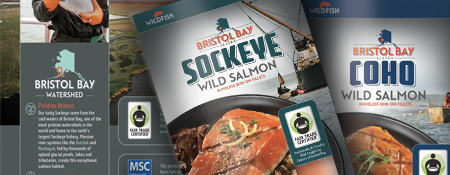ALASKA FAIR TRADE – GOOD FOR EVERYONE
Stakeholder Benefits

Retailers
An answer to the growing consumer awareness and demand for sustainable, responsibly sourced products
Research from the Natural Marketing Institute shows that consumer recognition of the Fair Trade Certified seal has been growing, along with the demand for products that align with the consumers’ values. Customers are not only looking for those products but are also choosing businesses that support the causes they believe in.

Fishers
A solution to lack of differentiation in the marketplace and price commoditization
Making a livelihood is an ongoing struggle for fishermen due to unpredictable seasons, market uncertainty and low prices dictated by buyers. Their profit margins are often paper-thin. Fair Trade boosts revenues because the fishers are guaranteed fair wages above the market average. In addition, the program provides preseason purchasing commitments. This makes it easier for fishers to plan their season as well as make a sustainable living.

Consumers
A seal that guarantees that rigorous social, environmental and economic standards have been met
Consumers are looking for seafood products that align with their values. However, the seafood industry is plagued with problems of mislabeling and lack of global standards. Part of the problem stems from a worldwide supply chain that is difficult to trace from the point of harvest to processing. The Fair Trade Certified seal ensures consumers that the products were harvested in ways that protect the environment as well as improve the fishermen’s lives. Fair Trade USA works closely with producers to certify their transactions with trade partners, and inspects fisheries each year to ensure standards are met.

Communities
A tool that empowers communities to makes choices that improve their lives
Buyers who participate in Fair Trade pay a premium above the seafood prices, and that extra goes into the fishermen’s community-development fund. The community decides together how to invest these funds into their social, economic and environmental needs. Common improvements include healthcare and education programs. While bettering the lives of families, the Fair Trade program also serves as an economic engine for remote, economically depressed or landlocked communities.
